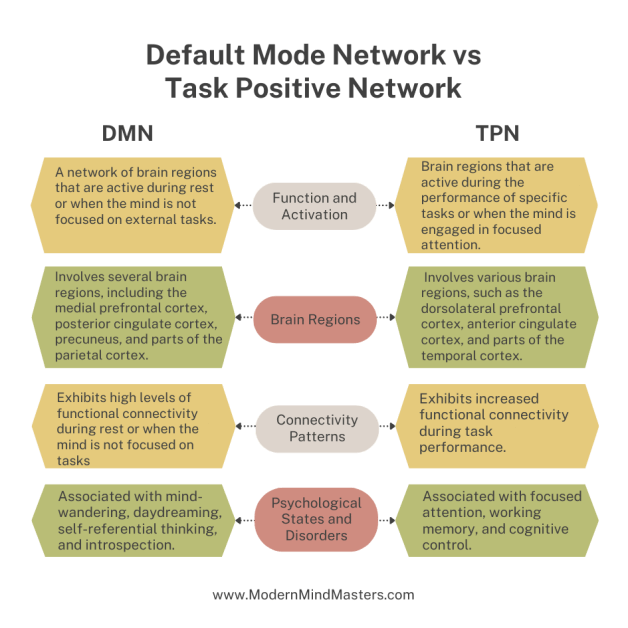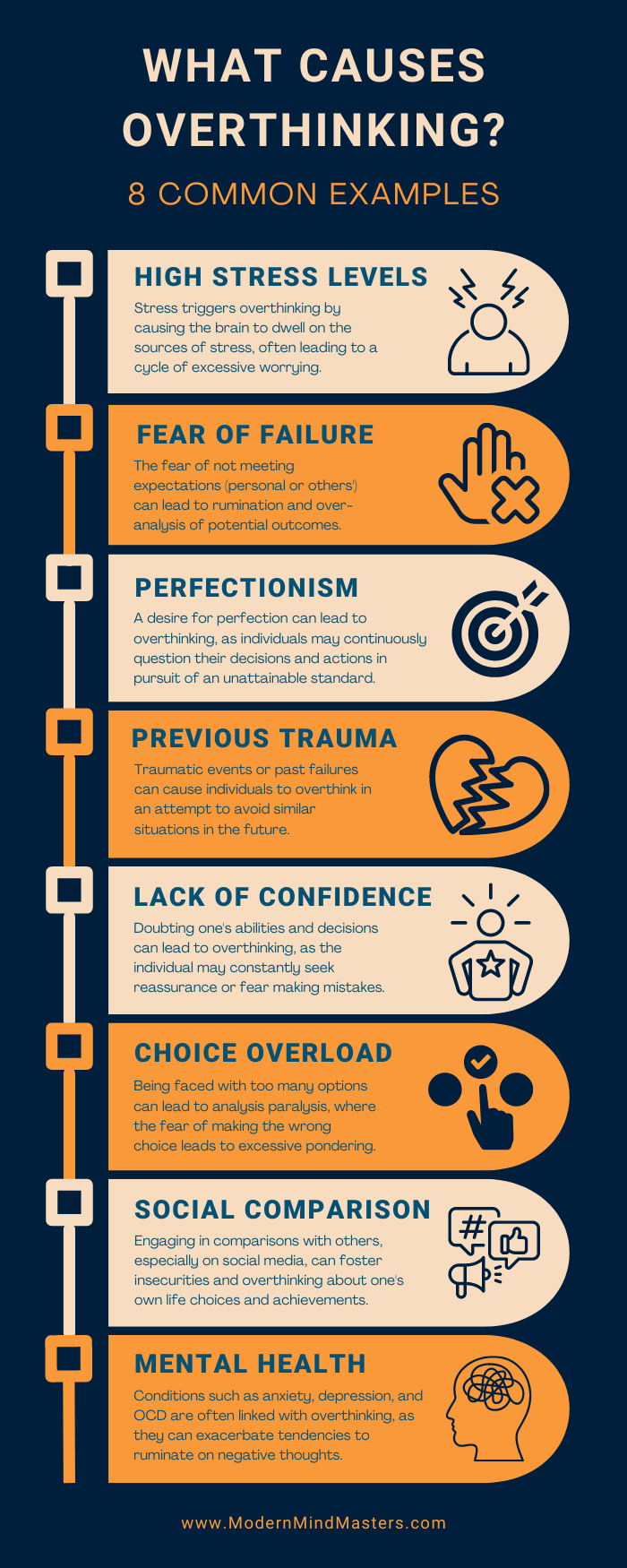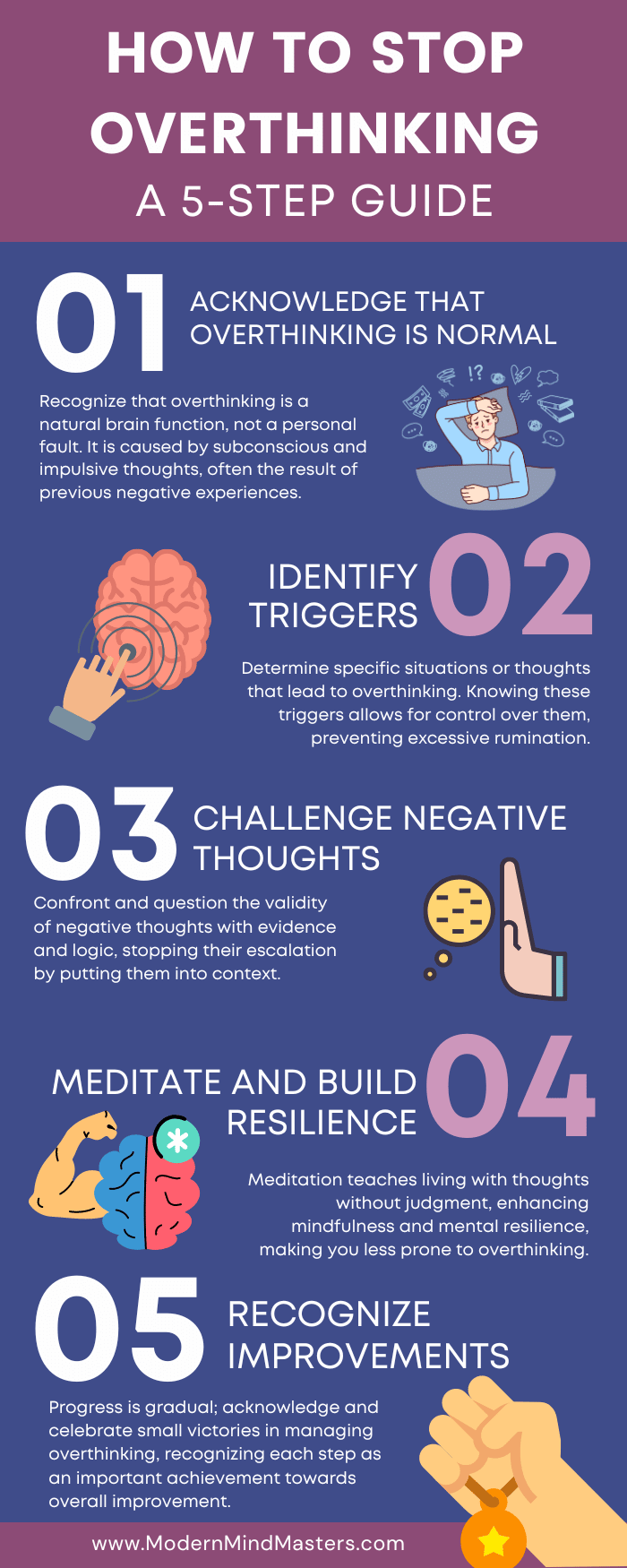
The 5 Best Self-Improvement Books That Actually Work
Here are the 5 best self-improvement books of all time that actually work.

There’s a fine line between productive contemplation and the exhausting cycle of overthinking everything.
Overthinking not only drains our mental energy but acts as a short circuit, leeching your focus and power away from constructive tasks and towards an endless loop of worry and speculation.
This article delves into the pervasive issue of overthinking, exploring its roots, from the excessive analysis and rumination that leads to analysis paralysis, to its strong correlation with mental health issues like depression.
By understanding the triggers and mechanisms behind overthinking, including its relation to underlying anxiety and the impact of childhood trauma on our thought processes, we can begin to tackle it head-on.
The good news? Overthinking is not an inherent trait but an accumulation of past negative experiences that lead to excessive rumination. As a result, we can take active steps to rewire these thoughts, enabling us to stop overthinking.
Whether it’s worrying about relationships, fearing the repercussions of past mistakes, or lying awake at night caught in a web of “what-ifs,” this article is your first step towards a more focused mind.
Overthinking refers to excessive analysis and rumination over thoughts or decisions, often leading to a cycle of excessive worrying or analysis paralysis.
We’ve all had these moments, where we dwell on poor decisions or embarrassing moments, or become overwhelmed with the amount of information we need to consider to make the best decision.
Overthinking centers on rumination, the repetitive and compulsive overthinking of past events, often focusing on negative experiences or feelings. Rumination is strongly and consistently correlated with depression and anxiety disorders and is the mechanism that scientists associate with mental health.
One of the most common triggers of overthinking is social relationships – the most googled complaint regarding overthinking is “How to stop overthinking relationships”.
“What if” questions are common for those who overthink, especially in relationships: “What if we’re not right for each other?”, “What if my partner wants to end things?”, “Where is this relationship heading?”
Overthinking typically results in a web of questions and hypothetical scenarios, and it is certainly not limited to relationships. From financial security to planning a family, there is no end of matters to overthink, should we enable ourselves to do so.
While we will see that overthinking to some degree is natural, and occurs in every healthy human brain, it becomes a significant problem when we allow it to escalate and spiral without constraint.
While thinking and pondering scenarios is natural, overthinking, which we define as excessive rumination that spirals out of conscious control, is what we really seek to manage when we wish to stop overthinking.
Overthinking by itself is not considered a disorder in clinical terms – it should not be interpreted as a psychiatric disorder or a syndrome.
Excessive rumination, however, can be considered a symptom or behavior that is indicative of mental health issues, especially anxiety and depressive disorders.
Research has shown, for example, that those who overthink appear to have variable overlap with common psychiatric constructs, including depression, anxiety, and PTSD.
Overthinking can also lead to a wide range of other problems and has been associated with insomnia, difficulty maintaining focus, and lethargy, all of which can increase how much we worry, creating a vicious cycle of overthinking. For those suffering from chronic anxiety or depression, overthinking can exacerbate symptoms.
Since overthinking is not a syndrome or disorder, there are no specific symptoms or diagnoses that can be categorically associated with it. Advances in neuroimaging technology, however, have highlighted specific brain regions that activate when overthinking and ruminating.
More specifically, functional brain imaging studies have identified that the default mode network (DMN) appears to be critically involved in ruminative processes, a network of brain regions that are active when the mind is at rest and not focused on the outside world, often involved in self-referential thoughts, daydreaming, and rumination.

Explaining the increase in these activated areas is more difficult, however.
One study explored the effects of childhood trauma on rumination, finding that children exposed to trauma or bad experiences during childhood show different brain activity compared to those who didn’t, highlighting how early traumatic and negative experiences can have long-lasting effects on how our brains work in later life.
Negative experiences are likely stored as subconscious memories, out of sight but not out of mind. When we encounter a trigger that engages these subconscious memories, it causes a corresponding increase in activity in parts of our brains associated with conscious thoughts, such as the prefrontal cortex, that try to deal with them.
For example, a person who has been cheated on previously in a romantic relationship will likely suffer a wide range of intense and often overwhelming emotions, as it represents a significant breach of trust and can shake the foundation of one’s beliefs about relationships and self-worth.
Shock, anger, sadness, confusion, and fear will all cause emotional harm and negatively affect a person until enough time has passed for these reactions to be overcome.
But while you can consciously forgive, the subconscious won’t forget; these emotional experiences will be stored indefinitely. It’s a survival instinct you subconsciously develop as a way to keep you from similar harm in the future.
When starting another relationship, your subconscious will commonly recollect these painful memories and emotions as a reminder of possible harm. The subconscious parts of your brain responsible for inducing feelings of fear, such as the amygdala, cannot tell the difference between emotional and physical pain, and see both as a threat.
Your brain will therefore remind you that relationships can end in pain in the same way getting too close to fire can. It is a primitive biological mechanism that aims to keep you safe.

The revelation that overthinking and excessive rumination are conscious logical overreactions to previous subconscious trauma and negative experiences is a significant one as it offers a range of possibilities of what should, and should not, be done to overcome it.
It is normal to question and mull things over to a large degree; it is the primitive parts of your brain thinking through all the possible scenarios to ensure you stay safe and out of harm’s way.
It is therefore pointless to try to eliminate negative thoughts from occurring altogether. You cannot control impulsive subconscious thoughts from appearing anymore than you can control feeling hungry or hot – they are instinctive impulses that stem from emotional processing parts of the brain, such as the amygdala, that operate far faster than our slower conscious prefrontal cortex can react to.
Blaming yourself or carrying any negativity and guilt associated with unwanted thoughts is therefore futile, and is usually the source of why these unpleasant thoughts affect us so much.
Instead of thinking “These thoughts are natural and, although unpleasant, occur in every healthy mind as a way of our subconscious and primal neural circuits trying to keep us safe”, we think that these thoughts are personal to us and that it is somehow your fault that you feel this way. No wonder we suffer from overthinking so much.
The next time you feel yourself getting carried away in rumination and overthinking, simply acknowledge that it is not your fault – these thoughts are indicative of a healthy mind evaluating what it perceives as potential threats, and that they may be exacerbated by previous negative experiences that were outside of your control.
Give yourself a break. You cannot control these thoughts, but they similarly cannot control you as long as you are mindful of them. Try not to be ashamed of them, and acknowledge that you do not have to act upon these thoughts.
This simple act of mindfulness will provide a powerful relief that should stop these thoughts from escalating. Remember, we are not trying to stop these thoughts from occurring, we are trying to ground them in reality and stop them from escalating, the definition of excessive rumination and overthinking.
Since chronic overthinking often stems from previous negative experiences, it is important to identify any triggers that start this process.
According to research by Dr. Fred Luskin of Stanford University, the average person has approximately 60,000 thoughts per day. But what is truly concerning is that 75% of these thoughts are negative, and 95% are repetitive.
Finding your specific triggers amongst this barrage of thoughts will therefore require significant effort and mindfulness.
When you next find yourself overthinking, pause for a second to identify the what, where, and when of what preceded these thoughts. If you begin ruminating about a failing relationship, identify the what, when, and where of how this thought started, and see what previous experiences might have triggered this event.
By surrounding your negative thoughts in context, you gain significant power and control over them – the first step to avoid them spiraling out of control.
Once you have identified your triggers, and provided the objective reasons and experiences of why they might be present, challenge your negative thoughts with reasoning and logic.
What evidence do you have that these thoughts are true or will come true?
Here, we are metaphorically grappling with your emotional subconscious thoughts and manually applying conscious logic-based answers to cancel them out, stopping these thoughts before they spiral out of control.
Carrying on our example about overthinking whether a relationship will fail, challenge your specific thoughts. Why do you believe your relationship will end, and what circumstantial evidence do you have for this? Your previous experience was with a different person and cannot be directly applied to a different individual.
When worrying about failing an exam, what are specific justifications for this fear? If you’ve had previous negative experiences with failing exams, are you more prepared this time? Is it a subject you are more comfortable with? Are you really less prepared than everyone else?
A significant part of challenging your negative thoughts is to put them into their objective context. Is this exam really such a big deal? If you fail, is it the end of the world? Or is it just one of many other exams? If you fail, can you retake it? Have you tried your best, which, at the end of the day, is all you can realistically do?
By contextualizing your negative thoughts and placing them fairly within the bigger picture, you provide some much-needed context for your emotional subconscious thoughts, grounding them in reality before they have a chance to escalate.
One of the biggest misconceptions surrounding mediation is that it is a way for you to calm yourself and quieten your mind to push out all negative thoughts.
Unfortunately, it is rarely this easy. Mediation is not a reactive technique that can be used to quieten the mind when overthinking, but a proactive way to build mindfulness more generally, making it less likely you will succumb to overthinking. Meditation is an exercise that will build your mental resistance like how exercise will improve your physical resistance.
You can think of mediation as preparing for overthinking in a more controlled environment. When sitting in silence with no distractions, all manner of thoughts will flood your brain, similar to when you trigger a thought that leads to overthinking.
The goal of meditation is to remain calm and avoid any judgment, such as feelings of guilt while being aware of all the thoughts and emotions that will inevitably circulate in your mind. When not actively thinking about anything, the conscious mind will quieten, leaving a vacuum of thought that will soon be filled with subconscious thoughts, most of which will be unpleasant.
Instead of trying to ignore and block these negative thoughts, which we know is futile, try to remain calm and live contently alongside them, without blame or judgment. That is the goal and definition of mindfulness – to live with your thoughts, good or bad, without judgment.
After a few months of practice, you will notice this new air of mindfulness in your everyday endeavors, where you can better live alongside your thoughts without them escalating.
As a result, you will gain more conscious control of your thoughts, limiting the ability of subconscious thoughts to overcome your mind and escalate.
See the video for an excellent guided mediation session for overthinking and anxiety.
Despite being armed with strategies to curb overthinking, it will remain a pervasive challenge. Even the most mindful individuals aren’t immune to the occasional spiral of overthinking, underscoring its presence as an experience common to all humans.
Overcoming such a difficult task that is so entrenched in our deepest and darkest subconscious brain zones will be a continual lifetime challenge, so we must recognize and reward ourselves for any form of improvement, no matter how small and seemingly insignificant.
Our subconscious minds are shaped over the years, entrenched with habitual thoughts and patterns. Consequently, the process of reprogramming these deep-seated beliefs requires time and patience. It’s essential to cherish each small accomplishment as a considerable triumph. With persistence and patience, the broader transformation will naturally follow.
Whenever you find yourself being mindful of your thoughts, successfully recognizing your triggers, challenging your negative thoughts, or practicing meditation and other mindfulness-based techniques, celebrate each moment and reward them for what they are – small but significant wins that are taking you in the right direction.

For those looking for a little more help, consider the following books that have helped me on my journey to avoid overthinking
The Power of Now – Eckhart Tolle
This transformative book delves into the essence of mindfulness and the importance of living in the present moment.
Tolle argues that overthinking is primarily rooted in our fixation with the past and the future, causing unnecessary stress and anxiety. Through practical exercises and insightful teachings, he guides readers on how to silence the mind and embrace the now, which can significantly reduce overthinking and enhance overall well-being.
How to Stop Worrying and Start Living – Dale Carnegie
Carnegie’s classic work offers timeless wisdom on tackling one of overthinking’s main drivers: worry.
The book is packed with anecdotes, strategies, and principles that help readers understand how to break the cycle of worry and stress that leads to overthinking.
By focusing on living in the day, dealing with problems systematically, and avoiding future anxieties, Carnegie provides a roadmap to a more serene and focused mind
10% Happier – Dan Harris
In this part memoir, part self-help guide, ABC news anchor Dan Harris recounts his journey towards discovering mindfulness and meditation following a panic attack on live television.
Harris is candid about his skepticism towards meditation and how his perception shifted as he explored its benefits.
The book is an accessible and relatable guide on how mindfulness and meditation can reduce overthinking, increase happiness, and lead to a more balanced life, all while being deeply rooted in the practicalities of the modern world.
Success is no longer black and white but a near-infinite scale made of infinitesimally small pieces. Celebrate each small win for what it is – an important milestone that moves you in the right direction.
As long as you keep accumulating these small wins, your ability to stop overthinking is a matter of when not if.
Overthinking refers to excessive analysis and rumination over thoughts or decisions, often leading to a cycle of excessive worrying or analysis paralysis.
Overthinking by itself is not considered a disorder in clinical terms – it should not be interpreted as a psychiatric disorder or a syndrome.
Excessive rumination, however, can be considered a symptom or behavior that is indicative of mental health issues, especially anxiety and depressive disorders.
To stop overthinking. embrace mindfulness, identify and challenge triggers, meditate to build mental resilience, and celebrate small improvements.

Here are the 5 best self-improvement books of all time that actually work.

The benefits of grounding have been scientifically studied and include reductions in inflammation, diabetes, and stress.

Too much dopamine can be a bad thing; overindulgence will lead to lower motivation, addiction, and even depression. Learn how to dopamine detox with these 5 activities

Knowledge is not power without action, and habits form the consistent actions that compound over time to guarantee success.

If you’ve ever wondered “why do I feel like a failure” this article will show how it is normal and provide ways you can learn to overcome them.

Retirement will come sooner than you imagine. Learn why building retirement savings is vital and how much you need to start saving today.
© 2025 Modern Mind Masters - All Rights Reserved
You’ll Learn:
Effective Immediately: 5 Powerful Changes Now, To Improve Your Life Tomorrow.
Click the purple button and we’ll email you your free copy.
The breadth of knowledge compiled on this website is astounding. Every article is a well-crafted masterpiece brimming with insights. I’m grateful to have discovered such a rich educational resource. You’ve gained a lifelong fan!
Thank You! I’m glad you’re enjoying it!